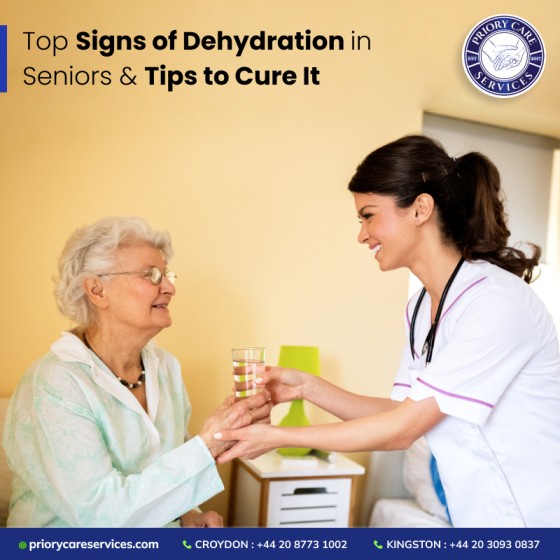We all know that our body is made up of approximately 75% water. Hence, keeping ourselves hydrated is extremely important, because if our body loses more water than it gets, it cannot function properly. However, it has been reported that in UK, people drink only 53% of the water that they should. In fact, people don’t even realise that they are dehydrated. This is extremely risky. And, older adults who become dependent on others, are more likely to become dehydrated. Hence, as a family member of an elderly person you have to keep a check on whether he/she is dehydrated or not. If you are unable to monitor their health constantly, then hiring a caregiver offering daily home care services in Croydon would be a wise choice for you.
Caregivers have the right knowledge, and can not only ensure that the elderly are drinking the right amount of water but also if the elderly are dehydrated, they can understand the signs. It is also important for you to know the signs and symptoms of dehydration as a family member. To help you learn about the signs of dehydration in the elderly, and how caregivers can take care of it, in this blog we have discussed it at length.
What Happens When an Elderly Suffers From Dehydration?
When an elderly become dehydrated, they tend to suffer from a lot of complications. These include:
• Loss of balance
• Constipation
• Kidney problems
• Electrolyte imbalances
• Heat exhaustion
In fact, due to dehydration, the elderly can suffer from more complicated health conditions for instance, since the problem can affect the brain, endurance decreases, and the heart rate can increase, which can lead to heart attack. Also, the blood pressure, and oxygen level can suddenly drop to a poor level.
Top Signs of Dehydration in the Elderly
A care provider offering daily home care services in Croydon can easily able to notice whether an elderly has dehydration since they know. Here are the top signs of dehydration in the elderly.
• Lethargy
• Sunken eyes
• Muscle weakness
• Decrease in urination
• Headaches
• Cracked lips
• Nausea
• Dizziness
• Forgetfulness/Confusion
• Rapid breathing
• Dry and sticky mucus in the mouth
• Urinary Tract Infection (UTI)
There are other signs, which can indicate that the person has diabetes. For instance,
- The trouble with moving and walking
- Diarrhoea or vomiting
- Seizures
- Psychosis, or delirium
- Fainting
How Caregivers Can Help Elderly Patients With Dehydration?
There are many ways in which a caregiver can help an elderly with dehydration. If you are sceptical about whether to hire a caregiver for your elderly loved one at home, here are some of the points that would help you to make the right decision.
Emergency help
If an elderly is suffering from severe dehydration and is at home, then someone should be continuously by his/her side. Health conditions like dizziness, weakness, and confusion can lead to sudden falls and accidental injuries. A caregiver who is trained to tackle such situations can be of great help to you as they know the right action to take, and you will have someone to rely upon.
Keep them hydrated
In dehydration, the patient is recommended to stay hydrated. If you have an elderly who is suffering from acute dehydration then staying hydrated become very important. A caregiver can ensure that the elderly drinks water timely, and is always hydrated.
Medication management
A caregiver will ensure that the elderly take the prescribed medicine on time. Old age is the period when medicines become an important part of life. And, when suffering from dehydration, the doctor may prescribe medicines. These must be taken by the elderly promptly. You may not always be able to be around, so hiring a helper would be beneficial.
Follow the right diet
Adding foods with a higher water content becomes an important step. A caregiver can certainly help here because they know the nutritional value of the food and what can cure dehydration effectively. For instance, consuming watermelon, strawberries, celery, cucumber, and others can be good sources of fluid. Plus, soups, stews, and broths can also be great for the dehydrated elderly. The caregiver can prepare all these foods.
To know in what more ways daily home caregivers can help, take a look here.
Conclusion
It is extremely important to keep older adults under continuous vigilance. Dehydration may show up suddenly if the body is not getting adequate water. Thereby, someone should always be there to ensure that the elderly are consuming enough water, that their diet is appropriate, and to take care of other concerns. And, if the elderly are suffering from dehydration, then an experienced caregiver would be the ideal person to take care of him or her. Hence, if you are based in Croydon, then for the best daily home care services in Croydon, you can contact Priory Care Services.




